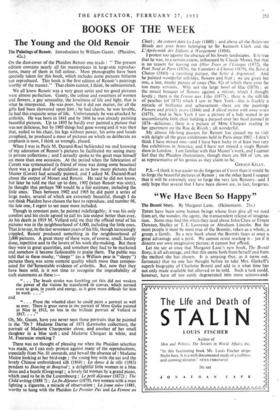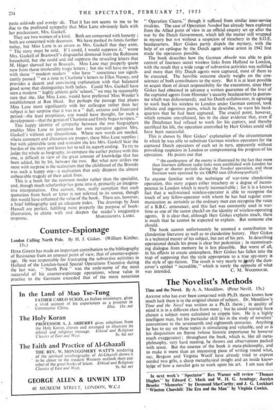"We Have Been So Happy" ,
The Brontë Story. By Margaret Lane. (Heinemann. 21s.) Iliatte have been some human beings whose lives give all we need from art, the wonder, the agony, the transcendent release of imagina- tion. Some may find this when they read about John Clare or Ernest Dowson, Shelley or T. E. Lawrence or Abraham Lincoln. But for most people it must be most true of the BrontEs, taken as a whole, a group, a family. So a new book about the Brontes faces at once a great advantage and a peril. We cannot resist reading it : yet if it distorts our own imaginative picture;-it cannot but offend.
Let me say at once that Margaret Lane's new book, The Bronte Story, is all advantage, and that this stems both from herself and from the method she has chosen. It is amazing (but, as it turns out, fortunate) that no one has thought before to take Mrs. Gaskell's superb biography of Charlotte Brontëand add to it what time has not only made available but allowed to be told. Such a task could, however, have all too easily degenerated into mere scissors-and- paste addenda and corrige da. . That it has not seems to me to be due to the profound sympathy that Miss Lane obviously feels with her predecessor, Mrs. Gaskell.
They are two women of a kind. Both are concerned with honesty ; both are concerned with decorum. We have pushed its limits further today, but Miss Lane is as aware as Mrs. Gaskell that they exist. " The story must be told. If I could, I would suppress it," wrote Mrs. Gaskell of Bramwell's disgraceful dismissal from the Robinson household, but she could and did suppress the revealing letters that M. Heger showed her in Brussels. Miss Lane may properly quote now from those intolerably tragic letters ; but she will have no truck with those " modern readers " who have " sometimes too signifi- cantly paused " on a note in Charlotte's letters to Ellen Nussey, and provides a decent and convincing explanation with that balanced good sense that distinguishes both ladies. Could Mrs. Gaskell have seen a modern " highly athletic girls' school," we may be reasonably sure that she, like Miss Lane, would have preferred Miss Wooler's establishment at Roe Head. But perhaps the passage that places Miss Lane most significantly with her colleague rather than her subject is her surprise that it was in a " dull, anxious and frustrated period—the least propitious, one would have thought, for such a development—that the genius of Charlotte and Emily began to ripen." This happy identity of sympathy between the two biographers enables Miss Lane to juxtapose her own narrative against Mrs. Gaskell's without any discordance. Where new words are needed, where comment and alteration are proper, these Miss Lane supplies ; but with admirable taste and restraint she lets Mrs. Gaskell bear the burden of the story and leaves her to tell its superb ending. To try to judge the whole as biography, to compare the earlier picture with this one, is difficult in view of the great amount of knowledge that has been added, bit by bit, between the two. But what now strikes me most with surprise is the realisation that the childhood of the Brontes was such a happy one—a realisation that only deepens the almost unbearable tragedy of their adult lives. This is a book for the common reader rather than the specialist, and, though much scholarship has gone into it, primarily an imagina- tive interpretation. One cannot, then, really complain that each quotation from book or letter is not referred to its source, though this would have enhanced the value of the book. There are, however, a brief bibliography and an adequate index. The drawings by Joan Hassall are perfect, fulfilling most properly the purpose of book- illustration, to chime with and deepen the reader's imaginative



































 Previous page
Previous page